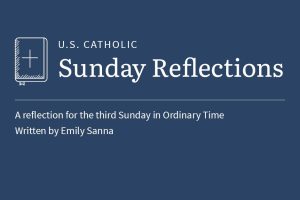Readings (Year B):
1 Kings 17:10 – 16
Psalms 146:7, 8 – 9, 9 – 10
Hebrews 9:24 – 28
Mark 12:38 – 44 or 12:41 – 44
Reflection: The widows’ might
Praise the Lord, my soul! Inspired words which come from one who lives in the abundance of God. This isn’t a superficial abundance where God conducts faith as if it were business. Faith isn’t transactional. Faith is transformational. The psalm’s words are deeply rooted in God’s transformative grace, and one who repeats them knows that the most authentic thing in life is God’s enduring love.
Pope Francis’ new encyclical, Dilexit nos, has a lot to say about God’s love. Right now, half the United States must feel like God’s love isn’t there. Millennia ago, biblical communities must have felt like God’s love wasn’t there. Yet, today’s readings realize the hope that God’s love is very much here.
Regardless of wherever we find ourselves around the increasingly widening chasm of political division, we ought to remember there’s more opportunity for community than division. Factors like shared history, shared religious anthropology, and a shared planet that faces catastrophe underscore that now is the time to reconcile, unite, and birth the salvation of Christ into the world, especially for those who eagerly await it.
In today’s readings, we’re graced by two examples of people who know God’s enduring love while they eagerly await salvation: two poor widows relying on divine providence. I can’t help but wonder if crushing poverty is what widowed these two in the first place. And I must ask, what kind of economy marginalizes them like this?
Christ condemns this type of society by warning about those who perpetuate this sort of unjust system, describing them as liking to accept greetings in the marketplaces and seats of honor at banquets. In today’s language, he might describe them as liking to accept greetings of social media influencers in digital marketplaces and seats of honor next to cardinals of the Catholic Church at banquets. This type of culture evidently operates from a scarcity mindset and, like media theorist Neil Postman laments, is all showbusiness.
However, there are exceptions to every cultural rule and the protagonists in today’s readings show us that for God, facades never trump authenticity. God’s enduring love secures justice for the oppressed, and God’s people—especially God’s church—must reform systems that continue to discard the poor and favor the wealthy.
In classic Judeo-Christian irony, two people considered least become authentic faith teachers. Or, like theologian Gustavo Gutierrez OP emphasizes, “Christian faith is a historical faith. God is revealed in Jesus Christ and, through him, in human history, and in the least important and poorest sector of those who make it up. Only with this as a starting point is it possible to believe in God.”
The women’s actions inspire Jesus to contemplate, and they inspire the Body of Christ to contemplate. Contemplation leads to union with God. Union with God necessarily means mobilizing Psalm 146 action in our historical context. We remember what Jesus did at the marketplace. Sorry! I meant his place of worship (the Temple). So, in this new historical chapter, what action does your contemplation lead you to? What can you do to inspire the rising up of those bowed down? How will your soul praise the Lord?













Add comment